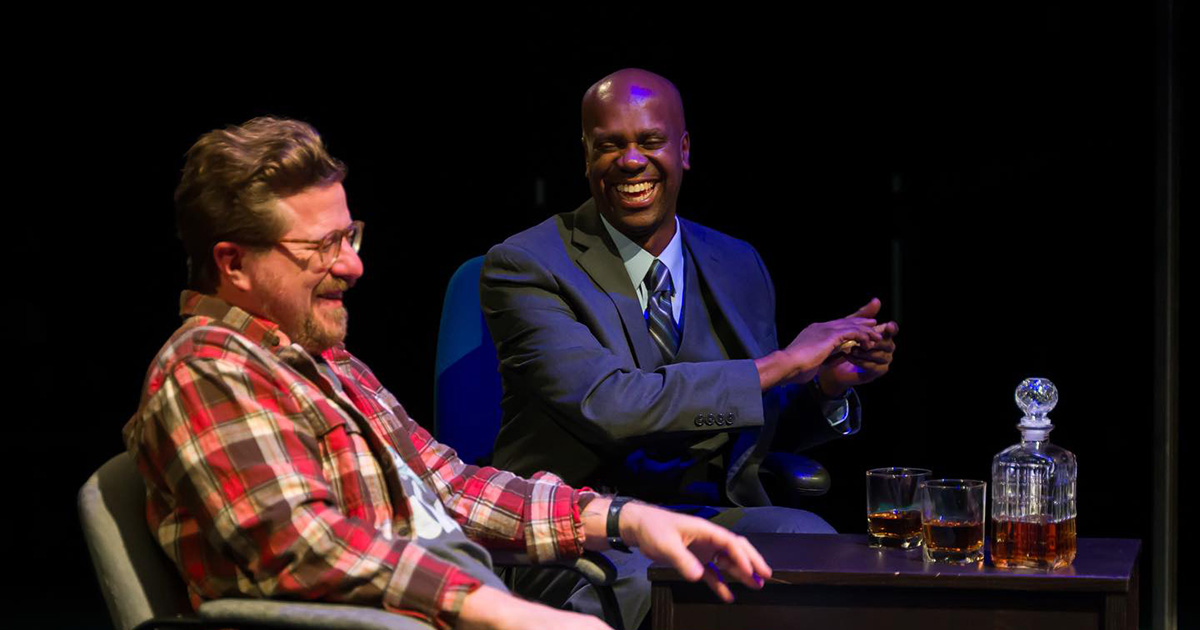The last ten years, or so, have been big ones for playwright Samuel D. Hunter. Along with a MacArthur Fellowship, his seventeen produced plays since 2010 include The Whale from 2012 which he subsequently adapted for a film directed by Darren Aronofsky which earned a Best Actor Oscar for Brendan Fraser. Like The Whale, most of his work has been set in Idaho, where he lived his first 18 years, although not entirely happily. This odd kind of dramatic specificity has allowed him to explore human existence and its turmoil defined by a particular corner of the American landscape. His latest, A Case for the Existence of God, continues that curious specificity and exploration in a deeply thought-provoking production that opened last Friday by River & Rail Theatre Company.
Set in Twin Falls, a town of 50,000 in southern Idaho, that world has been reduced to the metal outlines of a cell-like box for two characters, Ryan (Joshua Peterson) and Keith (Kenneth Herring). Ryan—white, straight, and a local yogurt plant employee—has come to the office of mortgage broker Keith—black, gay, and college-educated—for help in getting a mortgage. Ryan, baffled and confused by the mortgage process and jargon, as well as by personal money management in general, is equally baffled by everyday forces that press on his existence.
Although the actors never leave the “box,” that box takes on locations other than the office: a playground, Keith’s living room, the acreage Ryan wants to buy. In truth, they are trapped in a state of their own existence, unable to throw off their own particular tragic circumstances.

While Keith offers a pasted on smile and business-like compassion for Ryan’s situation at first, one questions whether it is real empathy. However, we learn that both share similar anxieties relating to child custody and that sets the play’s psychological wheels spinning. Ryan is going through a divorce and is embroiled in a custody battle. Keith is fostering a child to adopt, but is threatened with losing the child to a “family reunification.” At one point, Ryan offers out of the blue: “I think we share a specific kind of sadness.” With “sadness” we see that both men are in a battle with society’s norms: Ryan as an unredeemable financial risk and unsuitable parent; Keith as a single, gay man seeking to become an adopting parent. Ryan wears his desperation openly as it bubbles within a physical discomfort; Keith has bottled up his desperation with education and experience, but cannot contain it in the face of his own reality or Ryan’s mind-numbing stubbornness.
There is real sadness in watching the inevitableness of personal failures and the subsequent life-changing disappointment, but the play’s conclusion offers a sudden and surprising breath of hope that things work out. This is Hunter making his case; the audience can, and should, draw their own conclusions.
Director Rico Bruce Wade has guided the play along through mini-moments of angst in each of the characters, producing maximum emotion with a minimum of physical movement from the actors. Selling a role with mostly body language and facial expression is both a dream and a dread for actors, but here it is one that is a joy to observe and savor in Peterson and Herring.
Designer Sophie Smrcka’s steel cube and Scott Baron’s space-defining lighting were the perfect complement to the action of inaction. Costume designer Kyle Schellinger placed Ryan in a well-worn “Idaho” tee shirt, a nod to Hunter’s dramatic milieu.
[RECOMMENDED]
A Case for the Existence of God by Samuel D. Hunter
River & Rail Theatre Company in the Old City Performing Arts Center, 111 State Street
One Act without Intermission; Approx. 90 minutes
Thursday – Sundays through October 8
Tickets and Information







Saw this play on Saturday and seriously have not been able to stop thinking about it. The actors were perfect in their depictions of men and how society has formed them to handle their relationships and emotions. I am definitely planning on seeing it again before it closes.